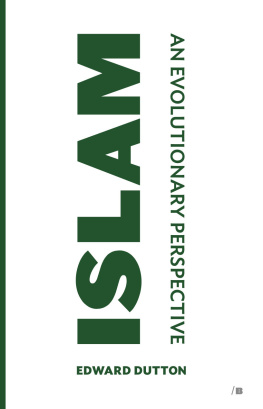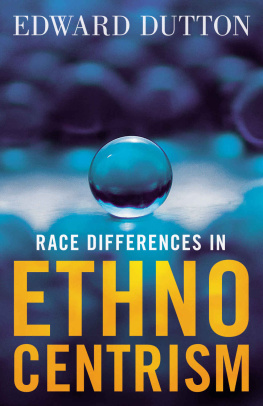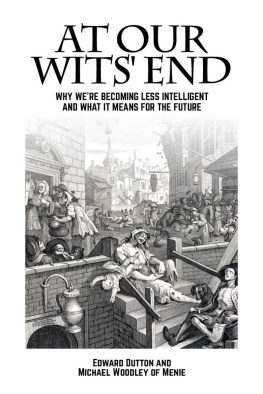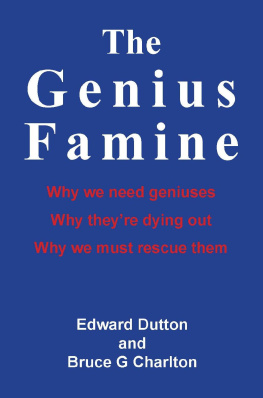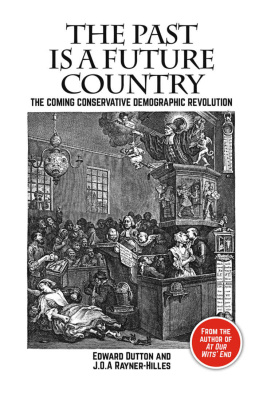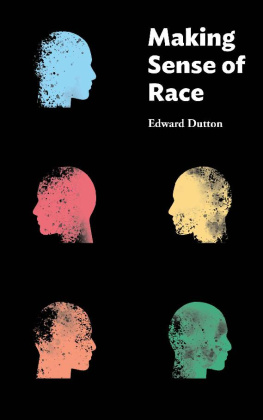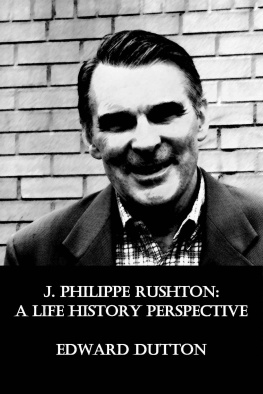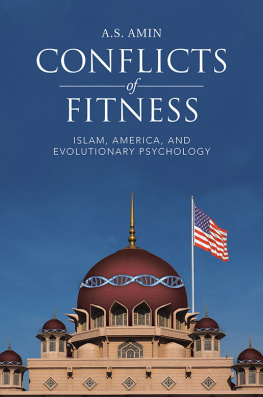Edward Dutton - Islam: An Evolutionary Perspective (Brevis)
Here you can read online Edward Dutton - Islam: An Evolutionary Perspective (Brevis) full text of the book (entire story) in english for free. Download pdf and epub, get meaning, cover and reviews about this ebook. year: 2021, publisher: Washington Summit Publishers, genre: Religion. Description of the work, (preface) as well as reviews are available. Best literature library LitArk.com created for fans of good reading and offers a wide selection of genres:
Romance novel
Science fiction
Adventure
Detective
Science
History
Home and family
Prose
Art
Politics
Computer
Non-fiction
Religion
Business
Children
Humor
Choose a favorite category and find really read worthwhile books. Enjoy immersion in the world of imagination, feel the emotions of the characters or learn something new for yourself, make an fascinating discovery.
- Book:Islam: An Evolutionary Perspective (Brevis)
- Author:
- Publisher:Washington Summit Publishers
- Genre:
- Year:2021
- Rating:5 / 5
- Favourites:Add to favourites
- Your mark:
- 100
- 1
- 2
- 3
- 4
- 5
Islam: An Evolutionary Perspective (Brevis): summary, description and annotation
We offer to read an annotation, description, summary or preface (depends on what the author of the book "Islam: An Evolutionary Perspective (Brevis)" wrote himself). If you haven't found the necessary information about the book — write in the comments, we will try to find it.
Islam: An Evolutionary Perspective (Brevis) — read online for free the complete book (whole text) full work
Below is the text of the book, divided by pages. System saving the place of the last page read, allows you to conveniently read the book "Islam: An Evolutionary Perspective (Brevis)" online for free, without having to search again every time where you left off. Put a bookmark, and you can go to the page where you finished reading at any time.
Font size:
Interval:
Bookmark:
An Evolutionary Perspective
Second Edition
Edward Dutton
Brevis is a series of short books on key concepts, produced by Washington Summit Publishers and Radix.
2021 by Edward Dutton
All rights reserved.
No part of this publication may be reproduced, distributed, or transmitted in any form or by any means, including photocopying, recording, or other electronic or mechanical methods, or by any information storage and retrieval system, without prior written permission from the publisher, except for brief quotations embodied in critical reviews and certain other non-commercial uses permitted by copyright law. For permission requests, contact the publisher.
Washington Summit Publishers
P.O. Box 1676
Whitefish, MT 59937
email : hello@WashSummit.com
web: www.WashSummit.com
Cataloging-in-Publication Data is on file with the Library of Congress
Paperback ISBN: 978-1-59368-075-6
eBook ISBN: 978-1-59368-076-3
Audio ISBN: 978-1-59368-077-0
Printed in the United States of America
10 9 8 7 6 5 4 3 2 1
Parts of this book, in slightly different forms, have previously appeared in At Our Wits End: Why Were Becoming Less Intelligent and What It Means for the Future (2018), which I co-authored with Michael Woodley of Menie, and in The Mutant Says in His Heart, There Is No God: The Rejection of Collective Religiosity Centred Around the Worship of Moral Gods is Associated with High Mutational Load (2018), which appeared in Evolutionary Psychological Science and which I co-wrote with Guy Madison, and Curtis Dunkel. I acknowledge my intellectual debt to these colleagues. I would also like to thank Herr Emil Kirkegaard for drawing my attention to some highly relevant literature, as well as Richard Spencer, Nils Wegner, and Martin DAnnunzio for editing and developing this book.
It is appreciated that this is a rather controversial topic and it cannot be emphasized enough that there are many positive dimensions to Islam; indeed, it is how these positive dimensions manifest themselves that has fascinated me for so long. But at the same time, there is no reason why we shouldnt be clear what we mean. I first became interested in Islam in about 1987, because my best friends at Infants School were Muslim. Accordingly, I would like to dedicate this book to Yusuf and Saad, as well as to their respective parents and siblings.
Edward Dutton
March 2021
Oulu, Finland
As we come into the third decade of the 21st century, the human sciences are in a peculiar state. Good quantitative knowledge about human naturegood enough for the kind of robust speculation that energizes scientific discovery, sometimes good enough to have immediate predictive valueis accumulating very fast. Yet even as our understanding advances, public discussion of topics in the human sciences is fiercely constrained by obscurantist political taboos. Indeed, as knowledge advances, the constraints seem to tighten and the taboos, multiply. When, at the turn of the century, earnest editorialists in respectable broadsheet newspapers were assuring us that There Is No Such Thing As Race, I thought we had reached peak obscurantism; the taboos could surely not stand much longer on such patently false foundations. Now, 20 years on, those editorialists are telling us that There Is No Such Thing As Sex. What next? There Is No Such Thing As Age? No Such Things As Day and Night?
Fortunately, the armies of obscurantist orthodoxy dont have things all their own way. A small defiant cadre of human-science researchers have been laboring to bring our new understandings to general attention. Indeed, we now have a new generation of these dissidents. David Becker, Davide Piffer, and Michael Woodley of Menie are following the trails blazed by Hans Eysenck, Arthur Jensen, Richard Lynn, Helmuth Nyborg, Bruce Charlton, J. Philippe Rushton, and Tatu Vanhanen.
Edward Dutton is one of the liveliest and most engaging of this new generation of academic dissidents. His YouTube channel, The Jolly Heretic, presents entertaining commentary informed by wide and deep reading in evolutionary psychology and anthropology. Edward Dutton is what Bill Nye the Science Guy would be, if that gentleman dared to present the human sciences with uninhibited objectivity. Dutton is particularly good on the subject of religion, the topic of his Ph.D. thesis. It was inevitable that he would, sooner or later, give us a book on Islam. And here it is.
Why do Muslim nations have lower mean IQ than non-Muslim nations they are genetically close to? How does religiosity relate to ethnocentrism? Does the custom of purdah increase paternal investment? (Dads not cads.) Does it cause vitamin D deficiency in women? Does a month of compulsory fasting affect pregnancy? Why did Muslim creativity decline after A.D. 1000? How does slavery affect the gene pool? Our author offers reasoned, well-informed arguments on these and a host of other questions we have all wondered about at some time or other. And what are the prospects for European societies being transformed by mass Muslim immigration? Shall our flagging civilizational energies be reinvigorated by a new infusion of religiosity? Or are we doomed to inherit those improvident habits... and insecurity of property that Winston Churchill says exist wherever the followers of the Prophet rule or live? We shall find out. Until we do, here is Edward Dutton to weigh the probabilities for us from a deep, solid base of learning and insight.
John Derbyshire
Huntington, New York
December 10, 2019
Muslims and Intelligence
How dreadful are the curses which Mohammedanism lays on its votaries!
Winston Churchill
Winston Churchill summed up Islam in 1898 in his book The Story of the Malakand Field Force. He described the British armys campaign, of which he was part, in what is now the border area between Afghanistan and Pakistan, passing comment on the culture of the natives as he did so:
How dreadful are the curses which Mohammedanism lays on its votaries! Besides the fanatical frenzy, which is as dangerous in a man as hydrophobia in a dog, there is this fearful fatalistic apathy. The effects are apparent in many countries. Improvident habits, slovenly systems of agriculture, sluggish methods of commerce, and insecurity of property exist wherev er the followers of the Prophet rule or live.
Cutting through the flowery Victorian language, what Churchill meant was that, when it comes to Muslim peoples, there is, on average, not that much going on upstairs. They arent very intelligent, and certainly they are nowhere near as intelligent as Europeans. This is simply an empirical fact.
In his book The Office and the average high-school science teacher.
This low average IQ can also be found among the increasing number of Muslim immigrants, as well as their descendants living in Western countries. Danish males are subject to a system of military draft. Researcher Muslims in Western countries have IQs which are almost 15 points lower than the native populations IQ.
Fascinatingly, low-IQ immigration from the Indian Sub-Continent is very much a Muslim issue, rather than, as some might believe, an issue solely of race or having a South
This should be deeply concerning when you consider that a meta-analysis of
Accordingly, there really does appear to be very little question about it. Muslims are, when compared to those who are from countries that are genetically relatively similar but dominated by other religions, not very bright;. This is something that has been shown to lead, as Churchill observed, to apathy and being slovenly, improvident, and sluggish. But Churchill doesnt really answer the question Why? Why are Muslims so deficient in intelligence? Is it that people of low intelligence tend to be less likely to reject Islam, if that is the religion in which they have been raised? Or is it that Islam actually makes you stupid ? Are there things about the nature of Islam that somehow create people who just arent very clever? And if that is so, what are those things? And how can Muslim countries have even survived in battle against otherpresumably more militarily strategicpeoples, if they are, apparently, so intellectually backward?
Font size:
Interval:
Bookmark:
Similar books «Islam: An Evolutionary Perspective (Brevis)»
Look at similar books to Islam: An Evolutionary Perspective (Brevis). We have selected literature similar in name and meaning in the hope of providing readers with more options to find new, interesting, not yet read works.
Discussion, reviews of the book Islam: An Evolutionary Perspective (Brevis) and just readers' own opinions. Leave your comments, write what you think about the work, its meaning or the main characters. Specify what exactly you liked and what you didn't like, and why you think so.

